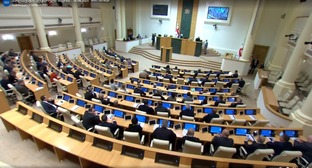03 March 2014, 09:00
Week in the Caucasus: review of main events on February 24-March 2
Statements made in Southern Russia in support for compatriots in Ukraine and press conference of Viktor Yanukovych in Rostov-on- Don; commemoration of those killed in Khojaly and Sumgait; suspension of three banks in Ingushetia and Dagestan, – see the review of these and other events in the Caucasus during the week of February 24-March 2, 2014, prepared by the "Caucasian Knot".
People in Southern Russia express concern over situation in Ukraine and support of compatriots there
The events in Ukraine, which turned into change of power, have affected the southern regions of the Russian Federation. On February 26, it was announced that a delegation of Ukrainian Cossacks arrived in the pre-border areas of the Rostov Region and claimed asylum. The regional authorities expressed their readiness to adopt Ukrainian refugees and provide them with the necessary assistance. On March 1, after an appeal of the Crimean authorities, the Russia's Federation Council adopted a resolution sanctioning the use of Russia's Armed Forces in Ukraine. On March 2, Rostov Governor Vasily Golubev spoke about thousands of Ukrainians who want to stay indefinitely in the Russian Federation. On the same, Krasnodar hosted a rally of many thousands, who expressed their support for residents of the Crimea.
On February 28, President Viktor Yanukovych, who was removed from office, said during his press conference organized in Rostov-on-Don that Russia should intervene in the events in Ukraine, but without any use of military force and without violating the country's integrity.
Azerbaijan and Nagorno-Karabakh commemorate Khojaly and Sumgait casualties
Last week, residents of Southern Caucasus paid tribute to victims of two events related to the Karabakh conflict. On February 26, Azerbaijan marked the 22nd anniversary of the tragedy in the town of Khojaly in Nagorno-Karabakh. In Baku, thousands of people laid flowers at the monument "Mother's Call"; and the country's mosques held memorial religious ceremonies. On February 28, the city of Stepanakert, the capital of Nagorno-Karabakh, marked the 26th anniversary of pogroms in the city of Sumgait, Azerbaijan, with a mourning procession. On February 26, information appeared about a mass hacking of Azerbaijani and Armenian websites.
Fire at chemical factory in Budyonnovsk
A serious incident occurred in Budyonnovsk, Stavropol Territory, where a fire broke out at a chemical factory "Stavrolen". The extinguishing operation lasted for four days; and 12 people were hospitalized. Investigators believe that the fire of the polymerization reactor in one of the factory shops was caused by a violation of safety regulations.
Volgograd hunger-strikers announce change of format
On February 24, the participants of the hunger strike, which is held in Volgograd since February 4 by parents with many children and parents of children with disabilities, reported a suspension of their daily hunger strike, mainly because of health problems with the majority of them; however, they continue their so-called "fan-type" (intermittent) hunger strike, which is supported by 382 people. Earlier, some of the hunger-strikers said that many of their personal problems had been solved, but they intended to continue the action until all their demands were met.
Three banks – in Ingushetia and Dagestan – stopped
On February 24, the Banks "Sunzha" and "Russian-Ingush" (RIngkombank), registered in the Republic of Ingushetia, lost their licenses. According to Russia's Central Bank, they had been involved in suspicious transactions. The Deposit Insurance Agency (DIA) has appointed the Bank "Education" to be the mediator, which will pay insurance compensations to the depositors of these banks.
On February 25, the license on work with individuals' deposits was withdrawn from the Makhachkala-based "Esidbank". Local experts were of the opinion that the decision of the Russia's Central Bank could be caused by the financial instability of the bank and the general desire of the federal financial authorities to reduce the number of regional banks.





Комментирование через Кавказский узел